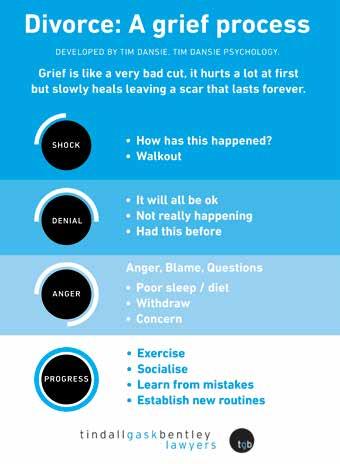
2 minute read
Legal
L
Wendy Barry Partner Tindall Gask Bentley Lawyers
LEGAL Separation and divorce – how mental health suffers
Initiating a separation or divorce inevitably comes with emotional challenges which, to varying degrees, can affect mental health. This is because a divorce or separation is one of the toughest things a person can go through. Consequently, depression and/ or anxiety, diagnosed or undiagnosed, is often a factor.
A common experience is that separation brings with it a need to learn to live in a new way, cope with loneliness and loss, and deal with the practicalities of being responsible for things that previously might have been shared.
These experiences and responses to separation and divorce impact on mental health, such that almost everyone going through a separation and/or divorce has some mental-health issues to deal with.
The impact of the divorce process on mental health is potentially enormous.
When a person is suffering mental ill health there is the possibility for the process to be more emotional. That interferes with the ability to think objectively and often results in unnecessary arguments because anger or hurt gets in the way.
This has the potential to escalate conflict which ultimately drives up the costs of the process and can get in the way of the ability to make decisions. Making progress then becomes difficult; and the costs are not only financial. There are also the human costs on the children, on each other and on friends.
Mental ill health can put at risk any agreements that are reached when one of the parties to the agreement lacks the capacity to consent to it. That is, when one party is so affected by his or her separation and/or divorce that he or she is unable to understand the consequences of his or her decisions and instructions.
Any agreement entered into in these circumstances could be vulnerable to be set aside in the future by a court – potentially devastating for all parties. (There are legal solutions to avoid the risk of an agreement being created when capacity is at risk, including by appointing a litigation guardian on behalf of the person with mental ill health).
As part of a property settlement or spousal maintenance claim, monetary adjustments and awards in favour of the party experiencing mental ill health can flow if, for example, it precludes him or her from working.
The future care arrangements of children could be changed when one of the parents is deemed at risk on account of poor mental health.
If you feel you are unable to cope, want to cause yourself or others harm, or are sad a lot or all the time, you should ask for help, including from your GP.
If you are going through a divorce or separation and want help to make arrangements for the future care arrangements for children
and/or to effect a property settlement, our team of experienced lawyers is here to work with and help you.
We will look after you with respect and care, and your information will be treated confidentially and discreetly.






